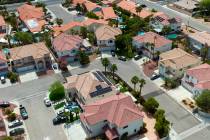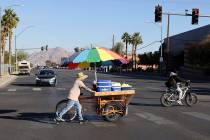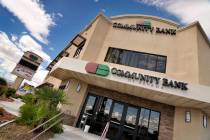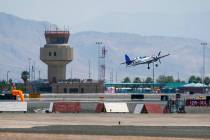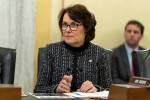Protests greet latest planned power increase
A handful of locals attended a public-comment session Wednesday to protest a potential new increase in their power bills.
The boost, a 3.2 percent overall jump that would increase the average monthly residential bill by $6, would come on top of a 6.9 percent increase the state Public Utilities Commission passed in June, so perhaps it wasn't a surprise that consumers balked at yet another rate request.
Richard Lozo, one of the first to speak, helped set the tone of the session inside the Clark County Library on East Flamingo Road.
"I've been to these meetings the last seven, eight, nine years, and every time you turn around, somebody wants a raise for (NV Energy)," Lozo said. "Residential customers in Nevada are being taken all the time."
NV Energy says it needs to recoup $77.5 million it spent in 2008 on purchased power and fuel for plants, and to recover costs from incentive programs to reduce air-conditioning use. Roberto Denis, a senior vice president with NV Energy, said $72 million of the increase would cover the cost of purchased power and fuel the company bought but didn't make back through rates.
The power utility applied for rate increases of 4.2 percent on residential consumers and 2.3 percent on nonresidential power users, or 3.2 percent overall. The rates would start Oct. 1.
About 25 consumers attended the session, and 12 signed up to comment. That's a substantially smaller turnout than the 135 or so ratepayers who came to two April sessions concerning the utility's general rate case. About 40 people testified at those hearings.
Rebecca Wagner, the commissioner presiding over the case, suspected the heat kept people away Wednesday.
The few who did show up commented on a wide range of power-related topics, including NV Energy executives' pay, ice-cold office buildings that consume too much power and the possibility of transforming the utility into a consumer-run co-op. One attendee suggested authorities use thermal imaging to find homes that leak air and fine their owners. And Lozo even complained about "the 19 frickin' digits in my account number, which there's not enough room to write on my check."
But much of the testimony flogged NV Energy for suggesting yet another rate increase, and berated the Public Utilities Commission for allowing higher rates so often.
Sam Michael called NV Energy "one of the worst-run companies in the state, if not the West."
"You're a disgrace, an absolute disgrace," she said. "I'll be 70 in two months, and I'll never be able to retire because of (NV Energy) and the (Las Vegas Valley Water District)."
Denis said NV Energy officials are "conscious and empathetic" of the burden higher rates will place on locals.
If approved, the request would be the second of three electric-rate spikes in six months for Las Vegans, beleaguered by recession and its accompanying joblessness, underemployment, pay cuts and benefit reductions.
That 6.9 percent increase the Public Utilities Commission OK'd in June sent local power bills up 3 percent on July 1, with a 3.9 percent jump scheduled for Jan. 1. The July and January boosts will raise the average single-family household's power bill by nearly $125 in the next year.
The current case has different circumstances. It's a deferred-energy rate case for recovery of money NV Energy spent on power, whereas general rate cases like the one decided in June revolve around business costs such as asset depreciation, maintenance, labor expenses, debt interest, taxes and returns for investors. General rate cases are where regulators decide whether and by how much the utility will profit; deferred-energy rate cases entail actual fuel costs, on which NV Energy is prohibited from collecting income. It's a straight cost pass-through to consumers.
The operating costs established in a general rate case make up about 40 percent of a power bill, while passed-through fuel costs compose the remainder.
Those direct costs are relatively high right now because the current rate case involves fuel bought a year ago, when costs on the natural gas that fires most of NV Energy's plants ran about $12 per million British thermal units.
That price plummeted to about $3 per million British thermal units in 2009, so consumers should see substantial rate relief in upcoming deferred-energy rate cases, Denis said.
The Public Utilities Commission has scheduled a formal hearing for Aug. 26 at the agency's offices, at 101 Convention Center Drive, Suite 250.
The commission will collect public comments on general and deferred-energy rate cases for Southwest Gas today at 6 p.m. inside the Sunrise Library, at 5400 Harris Ave. Taken together, those cases would goose residential natural-gas rates by nearly $5 a month in the winter.
Contact reporter Jennifer Robison at jrobison@reviewjournal.com or 702-380-4512.








